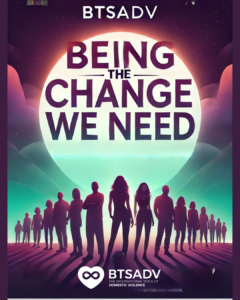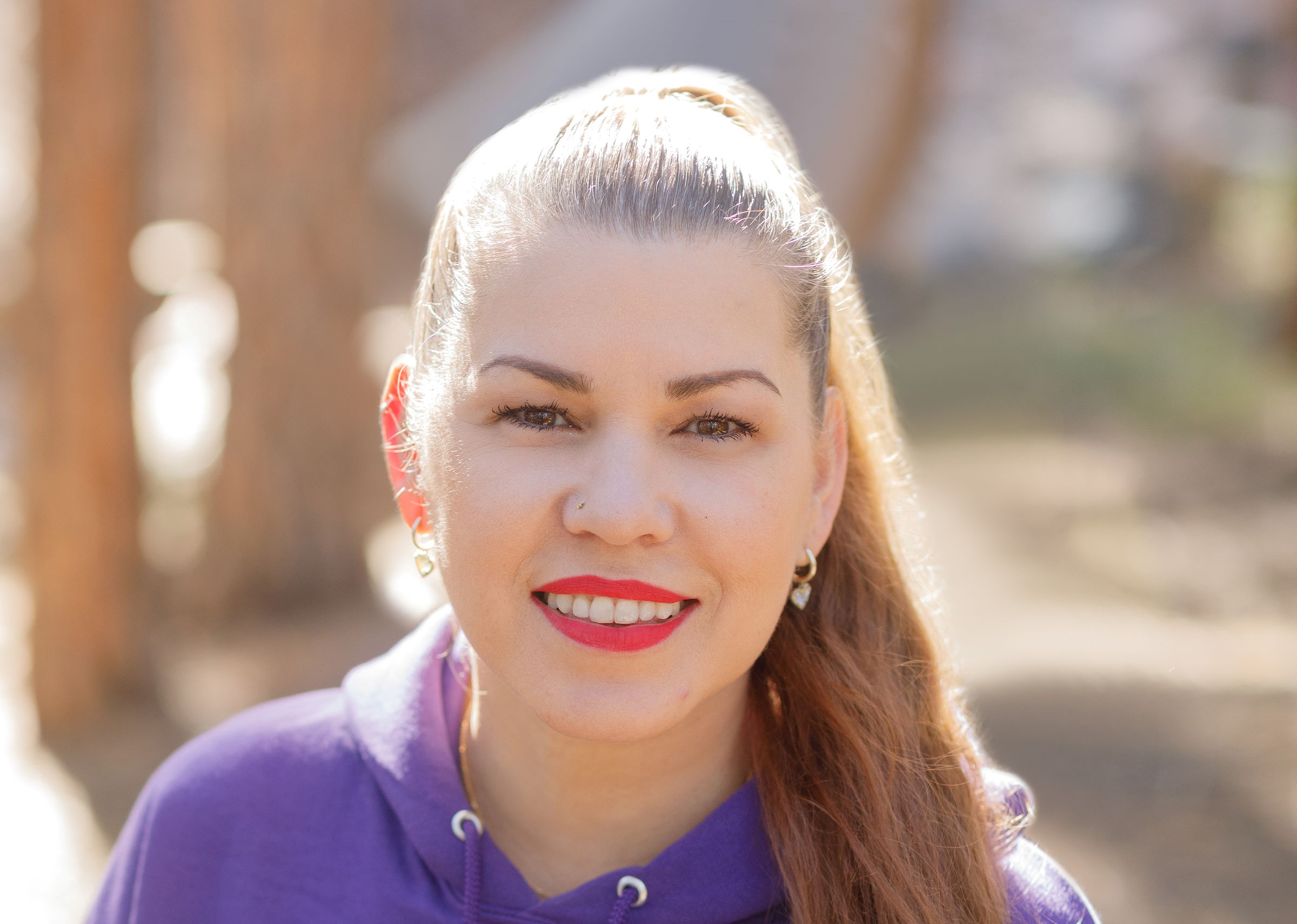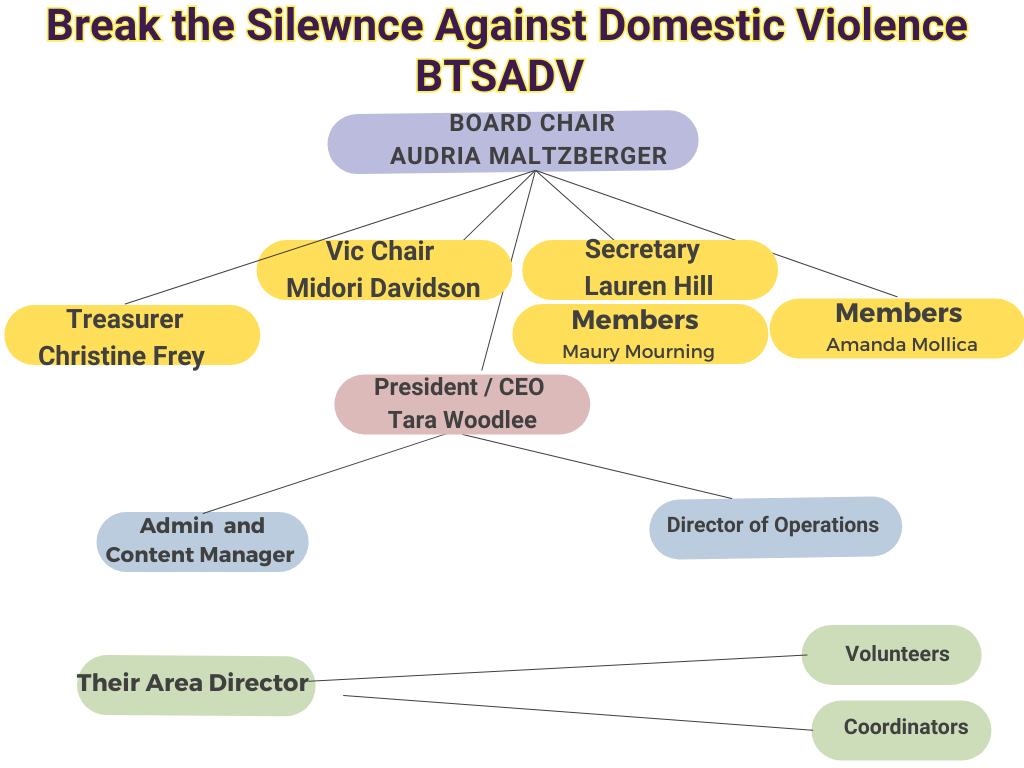Our Team and Board Members

Tara Woodlee
President & CEO
Tara Woodlee is the President & CEO of Break the Silence Against Domestic Violence. Previously, she served as the Board President from 2018 - 2022.
In 2012 Tara lost her 20-year-old daughter, Ashleigh Lindsey, and her unborn granddaughter Patience Lynn to a brutal act of domestic violence that made national news. Tara shares the raw truth about domestic violence and gives audiences the opportunity to learn about the impact abuse has on families from generation to generation. Tara, also a survivor, describes the journey from victim to survivor and then the impact her story made on her family finding out thru the death of her child of a 100-year-old history of this cycle of abuse within her family. This knowledge led her to found an organization in her child and grandchild’s honor called the Ashleigh’s Patience Project.
Through the pain, Tara has fought courts and is working to raise awareness and change laws not just across the nation but worldwide. Tara told Ashleigh’s story on Investigation’s Discovery Channel (Your Worst Nightmare) and was featured in an article in Cosmopolitan Magazine called Stop Calling It Domestic Violence It’s Intimate Terrorism, in the US.
The U.K. shared her tragic loss in magazines untitled Pick Me Up and Full House. Lastly, Ashleigh’s story is used in the Moving Forward resource that is to help young women identify the signs of domestic violence in their current or future relationships in Queensland Australia. Tara travels the country as a national speaker and Tara’s role in activism has been recognized through the Awarding of the Presidents Lifetime Service Award 2021.

Audria Tamez Maltsberger
Board Chair
Audria Tamez Maltsberger is a born and raised Texas Veteran, wife, and mother to three children, and Domestic Violence Survivor & Advocate for 16 years. In 2018, Audria became a volunteer for BTSADV and began to use her voice and experience on their Supportline to equip and empower others to live a life free from abuse. Her experience includes public speaking events, volunteer training, crisis intervention, and education through her Healing for Damaged Emotions class at her local church for the past seven years. She is currently enrolled at Southwestern Assemblies of God University and is pursuing her degree in Pastoral Leadership. Audria was BTSADV's Volunteer of the Month in April 2019 and Volunteer of the Year in 2020. In May of 2022, she became a Board Member and is now serving as their Board Secretary. Audria believes in the vision and passion of Break the Silence Against Domestic Violence and is honored to be a part of and continue to grow, educate and empower others to break their silence against domestic violence.

Midori Davidson
Board VS Chair
Ms. Davidson began as a volunteer with BTSADV 8 yrs ago as a blogger and social media volunteer. From there, she and the founder of BTSADV both discovered the need for a helpline based on the messages received through Facebook Messenger asking for help and referrals for various shelters. Once the helpline started—it was discovered through various conversations with our clients that there is a need for financial literacy assistance—how t o read a credit report, open a bank account, sort through debt, etc…after sharing these candid discussions others, a seed was planted to start a financial literacy program that will help survivors get on their feet, and it was named Grants of Hope. As a 17 yr survivor of Domestic Violence and Sexual Assault, Ms. Davidson uses her experiences to constantly develop programs to help survivors move forward from survival mode to LIVING. Ms. Davidson is also a legacy daughter as she lost her mother to Domestic Violence 36 years ago when she vanished out of thin air. When it was reported to the local police in Yazoo County, MS. Nothing was done—making her case a cold case. She strives to educate how Domestic Violence and Missing persons cases are often intertwined, and being a woman of color, they often go unnoticed with no sense of urgency—she is currently working on educational partnerships to bring this issue to the forefront.

Misty Medders
Board Treasurer
Misty Medders – Advocate, Survivor, and Leader Misty Medders is a dedicated advocate, survivor, and leader committed to breaking the cycle of domestic violence. A survivor since childhood, she has endured emotional, mental, spiritual, financial, and physiological abuse—yet she has emerged stronger, transforming her pain into purpose. As a single mother, Misty’s resilience fuels her passion for change. Since joining Break the Silence Against Domestic Violence (BTSADV) in 2019, she has served in multiple roles, from volunteer to Board Secretary, contract staff, full-time staff member, and now Board Treasurer. Her journey through these positions reflects her unwavering commitment to empowering survivors and ensuring they have the resources, support, and advocacy needed to reclaim their lives. Misty is more than a survivor—she is a warrior. By breaking her silence, she is ending the cycle of abuse for future generations. Her leadership and dedication stand as a beacon of hope, proving that healing is possible and that together, we can create a world free from domestic violence.

Lauren Hill
Board Secretary
Lauren I. Hill is a resource coordinator for Breaking the Silence Against Domestic Violence organization along with being a seven year survivor of domestic violence and abuse, who is passionate about community engagements, finding solutions, raising awareness, and educating others. Along with her role as resource coordinator, she is also the Director of Summer Residential Programs at University of North Carolina School of Arts and Senior College Advisor/Consultant for USN College Advisor Company. As a 2X first-generation college graduate, she has Bachelor of Arts degree in Liberal Studies with concentrations of English Literature and Religious & Theological Studies at St. Edward's University in Spring 2015, Master of Education degree in Higher Education and Graduate Certificate in Conflict Resolution and Management at Abilene Christian University in Spring 2021, and Certification in Mental Health First Aid for Youth/Teens in Fall 2023. With a background in education, mental health, and college admissions, Lauren is dedicated to creating safe and judgment-free spaces for all, helping high school and college students achieve their goals, creating opportunties, research solutions for students, fostering an inclusive education, and passionate about life, living, and contributing to her community. Outside of work, she likes to travel as much as she can, reading, cooking, exploring museums, attending concerts, . Also, she volunteers for the American Heart Association - Greater Houston Chapter, St. Edward's Houston Alumni Chapter, St. Edward's Alumni Association - Executive Board, and many other projects throughout the year. Always eager to connect with like-minded individuals, Lauren Hill is excited to contribute and collaborate with teachers, administrators, and communities to know the signs, symptoms, and solutions to preventing domestic violence and abuse as well as educating her community and inspire someone to get out of what could be detrimental to their life.

Maury Mourning
Board Member
Maury Danielle is a survivor advocate, trauma recovery life coach, and author dedicated to empowering survivors through an evidence-based Trauma Recovery Empowerment Model and an 8-step survivor-centered coaching program, R.E.C.O.V.E.R.Y. Her personal journey of resilience, from surviving childhood traumas, overcoming substance abuse in her youth, to breaking free from a decade-long abusive marriage, drives her unwavering commitment to help others find their own path to healing and empowerment. Maury firmly believes in the power of restoring individuals through awareness and prevention. Driven by her experiences, Maury shares her story to raise awareness about domestic violence, intimate partner abuse, and sexual assault. Committed to offering tools, techniques, and resources, Maury supports women, men and families in their journey to recover, rebuild, and restore their lives, ultimately helping them become ‘free to fly’. She continually invests in her personal and professional growth to serve others on their path to healing and empowerment. Most importantly by using her voice and empowering victims and society to break the silence against domestic violence, we can increase a survivor's chance of having access to recovery and living a whole and healthy life. Maury is a mom first and has two beautiful children. In her downtime, she enjoys traveling, learning, creating art, journaling, and spending time with her family. One of her favorite quotes is by the inspirational and influential Dr. Maya Angelou. "I've learned that people will forget what you said, people will forget what you did, but people will never forget how you made them feel.”

Tara Woodlee - President & CEO
Tara Woodlee is the President & CEO of Break the Silence Against Domestic Violence. Previously, she served as the Board Chairwoman from 2018 - 2022.
In 2012 Tara lost her 20-year-old daughter, Ashleigh Lindsey, and her unborn granddaughter Patience Lynn to a brutal act of domestic violence that made national news. Tara shares the raw truth about domestic violence and gives audiences the opportunity to learn about the impact abuse has on families from generation to generation. Tara, also a survivor, describes the journey from victim to survivor and then the impact her story made on her family finding out thru the death of her child of a 100-year-old history of this cycle of abuse within her family. This knowledge led her to found an organization in her child and grandchild’s honor called the Ashleigh’s Patience Project.
Through the pain, Tara has fought courts and is working to raise awareness and change laws not just across the nation but worldwide. Tara told Ashleigh’s story on Investigation’s Discovery Channel (Your Worst Nightmare) and was featured in an article in Cosmopolitan Magazine called Stop Calling It Domestic Violence It’s Intimate Terrorism, in the US.
The U.K. shared her tragic loss in magazines untitled Pick Me Up and Full House. Lastly, Ashleigh’s story is used in the Moving Forward resource that is to help young women identify the signs of domestic violence in their current or future relationships in Queensland Australia. Tara travels the country as a national speaker and Tara’s role in activism has been recognized through the Awarding of the Presidents Lifetime Service Award 2021.
The Board

Midori Davidson - Chairwoman
Ms. Davidson began as a volunteer with BTSADV 8 yrs ago as a blogger and social media volunteer. From there, she and the founder of BTSADV both discovered the need for a helpline based on the messages received through Facebook Messenger asking for help and referrals for various shelters. Once the helpline started—it was discovered through various conversations with our clients that there is a need for financial literacy assistance—how t o read a credit report, open a bank account, sort through debt, etc…after sharing these candid discussions others, a seed was planted to start a financial literacy program that will help survivors get on their feet, and it was named Grants of Hope. As a 17 yr survivor of Domestic Violence and Sexual Assault, Ms. Davidson uses her experiences to constantly develop programs to help survivors move forward from survival mode to LIVING. Ms. Davidson is also a legacy daughter as she lost her mother to Domestic Violence 36 years ago when she vanished out of thin air. When it was reported to the local police in Yazoo County, MS. Nothing was done—making her case a cold case. She strives to educate how Domestic Violence and Missing persons cases are often intertwined, and being a woman of color, they often go unnoticed with no sense of urgency—she is currently working on educational partnerships to bring this issue to the forefront.


Audria Tamez Maltsberger - Secretary
Audria Tamez Maltsberger is a born and raised Texas Veteran, wife, and mother to three children, and Domestic Violence Survivor & Advocate for 16 years. In 2018, Audria became a volunteer for BTSADV and began to use her voice and experience on their Supportline to equip and empower others to live a life free from abuse. Her experience includes public speaking events, volunteer training, crisis intervention, and education through her Healing for Damaged Emotions class at her local church for the past seven years. She is currently enrolled at Southwestern Assemblies of God University and is pursuing her degree in Pastoral Leadership. Audria was BTSADV's Volunteer of the Month in April 2019 and Volunteer of the Year in 2020. In May of 2022, she became a Board Member and is now serving as their Board Secretary. Audria believes in the vision and passion of Break the Silence Against Domestic Violence and is honored to be a part of and continue to grow, educate and empower others to break their silence against domestic violence.

Deanna
Deanna (Dee) is a survivor and knew 30 years ago she wanted to help others who ended up in abusive relationships. Dee finally made that happen and now is an LMFT and a LAC in the states of Colorado and Minnesota. Dee specializes in helping those with trauma and leading them to heal their past through EMDR (eye movement, desensitization, and reprocessing.) Dee loves her job and describes her clients as butterflies spreading their wings after leaving their cocoons of trauma. Outside of work, Dee is an animal rescuer at heart. She and her husband have four dogs and a few foxes who visit their house nightly. She enjoys feeding the many birds and watching the wildlife. She has two sons and one grandchild. Dee would tell you "my life is complete and the journey to get here was a rough sea leading to a beautiful paradise
BTSADV 2025









